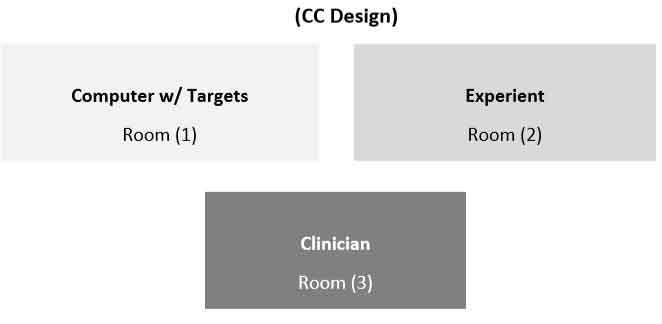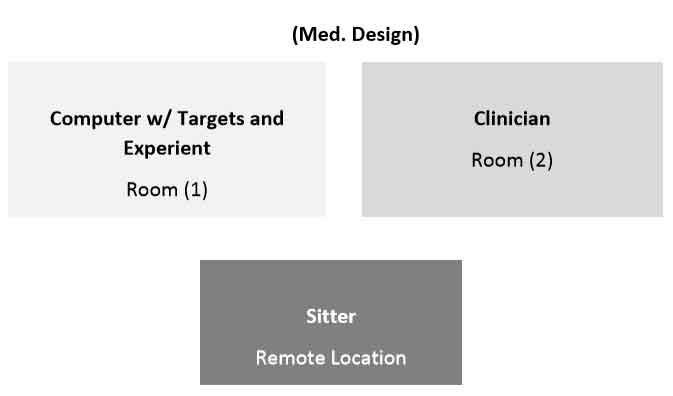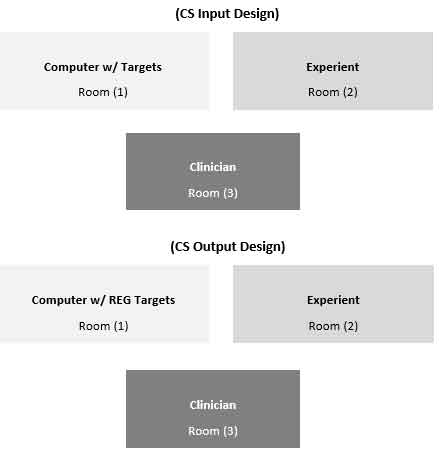Free Online Clairvoyance Course
Become a Student of Scientific Academic Clairvoyant Studies
“Do You want to Know More about how Clairvoyance Works Scientifically? Do You have Clairvoyance and want to Control and Enhance it? Announcing our our Free online Clairvoyant Course. Discover Your Hidden Potential through New Scientific based Courses. Become a Master of Your Clairvoyant Ability by Discovering how it works!“
 This course is offered for FREE by the Center for Exceptional Human Experiences. This course is designed for those with a background in psychological counseling, research, or academics. It outlines the nature of Clairvoyance, and is not designed as a step-by-step training course for those with clairvoyant experiences; though it is designed to be highly informative and instructive to those whom have clairvoyant experiences. For in-depth training courses, please refer to to our non-professional free courses still in development here.
This course is offered for FREE by the Center for Exceptional Human Experiences. This course is designed for those with a background in psychological counseling, research, or academics. It outlines the nature of Clairvoyance, and is not designed as a step-by-step training course for those with clairvoyant experiences; though it is designed to be highly informative and instructive to those whom have clairvoyant experiences. For in-depth training courses, please refer to to our non-professional free courses still in development here.
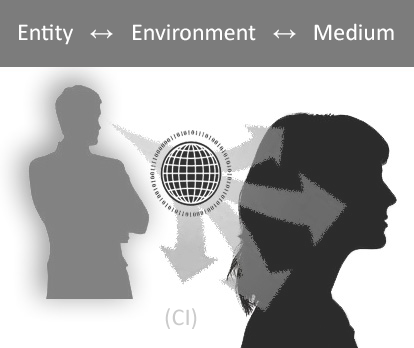 All course content is copyrighted and offered freely on our website. For students that wish to dive deeper into these subjects, we offer several academic books and papers for purchase online. This course is work-at-you-won-pace, and offers both an “honorary” and “certified” certificate of course completion.
All course content is copyrighted and offered freely on our website. For students that wish to dive deeper into these subjects, we offer several academic books and papers for purchase online. This course is work-at-you-won-pace, and offers both an “honorary” and “certified” certificate of course completion.
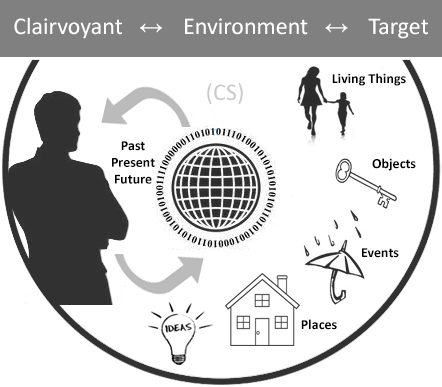 Honorary certificates do not require any type of exam and are free to download. Certified certificates require the completion of 1 exam and a small donation to the Center of Exceptional Human Experiences of your choosing via PayPal.
Honorary certificates do not require any type of exam and are free to download. Certified certificates require the completion of 1 exam and a small donation to the Center of Exceptional Human Experiences of your choosing via PayPal.
Want to be updated on course additions? Sign up for our Newsletter.
Parapsychological Terminology Glossary >>
COURSE STARTS HERE!
Lesson #1: Paraphysics
Lesson #2: Parapsychology
Lesson #3: Extrasensory Perception
Lesson #4: Clairvoyance
Clairvoyance is the psychical influence of an objective environment [i.e. or Universal Information System, Psychic Reservoir, or Nature], which is assumed capable of storing, retaining, and recalling information pertaining to the past and current states of objects and events, involved in the interim integration, processing, shifting, and retrieval of information pertaining to objects and events in real-time, and probabilistically determining the potential trajectory of future events. This is all achieved through the act of an experient [Clairvoyant] requesting and receiving information pertaining to past events [Postcognition] via the systems long-term information storage, and pertaining to remote current events [Remote Viewing/Sensing or Contemporaneous ESP] via the systems working memory or short-term information storage. This is also achieved through the computation of relative causal knowledge encompassing deterministic and random variables, which are hypothesized to be stored by the system and retrievable by the experient [Precognition].
In addition, Clairvoyance includes anomalous communication with immaterial entities [Mediumship] most commonly referred to as apparitions (ghosts) or spirit guides, which are believed to have a form of consciousness and element of personality. Assuming thought to be the basis of consciousness, this form of communication requires specific mental processes by which experients utilize for thought transference between the experient and immaterial entities. These thoughts are also transferred through intuitive, or emotional, modes or through several hallucinatory sensory modes including visual, auditory, olfaction, gustatory, and somatosensory modalities.
Models of Clairvoyance – A Quantum Mechanical Approach to Clairvoyant Phenomenology
Types of Clairvoyance
- Clairvoyance: Clairvoyant Cognition
- Clairvoyance: Clairvoyant Interaction
- Clairvoyance: Clairvoyant Simulation
- Clairvoyance: Temporal Phenomenology of Clairvoyance
Additional Topics
- Clairvoyance: Enhancing Working Memory
- Clairvoyance: Dream Journal
- Clairvoyance: Universal Information System Model
- Clairvoyance: Conceptual Universal Information
- Clairvoyance: Contextual Universal Information
Precognition is the psychical influence of a hypothetical universal information system capable of probabilistically determining the potential trajectory of future events. This is achieved through the computation of relative causal knowledge encompassing deterministic and random variables. These variables are then hypothesized to be stored by the system and retrievable by the experient. Whether an object has a couple or several potential trajectories, these future events are to some extent necessitated by past and present events.
Trajectories are quantified by the system and the most likely variables are determined, stored, and are limitedly accessible to experients of precognitive phenomena. This is hypothesized via a compatiblistic viewpoint involving determinism and free will in coherent cooperation; assuming that not every event has an unbroken chain of prior occurrences.
Models of Precognition – Precognitive Phenomenology
- Precognition: Probabilistic System Model
- Precognition: Neurological Causation & Interpretive Processes
Postcognition is the psychical influence of a hypothetical universal information system capable of storing, retaining, and recalling information pertaining to the past states of objects, and events. This is achieved through the act of an experient requesting and receiving information pertaining to past events via the systems long-term memory or long-term information storage.
The system captures, retains, and stores this information and can be requested by an experient in which is then conveyed intuitively and in the form of sensory hallucinations; primarily through the visual and auditory modalities. These hallucinations can also occur in other sensory modalities including olfaction, gustatory, and somatosensory.
Models of Postcognition – Postcognitive Phenomenology
Remote Viewing is the psychical influence of a hypothetical universal information system involved in the interim integration, processing, disposal, and retrieval of information pertaining to remote objects and events in real-time. This is achieved through the act of an experient requesting and receiving information pertaining to remote current events via the systems working memory or short-term information storage. This system is actively monitoring and manipulating information at a constant with real-time constraints; operational deadlines between event to system response.
The system captures, retains, and stores this information and can be requested by an experient in which is then conveyed intuitively or in the form of sensory hallucinations; primarily through the visual and auditory modalities. These hallucinations can also occur in other sensory modality including olfaction, gustatory, and somatosensory.
Models of Remote Viewing – Remote Viewing Phenomenology
- Remote Viewing: Real-Time System Model
- Remote Viewing: Neurological Causation & Remote Viewing/Sensing Processes
Mediumship is the anomalous communication with immaterial entities most commonly referred to as apparitions [ghosts] or spirit guides, which are believed to have a form of consciousness and element of personality. Assuming thought to be the basis of consciousness, this form of communication requires specific mental processes by which experients utilize for thought transference between the experient and immaterial entities. These thoughts are transferred through intuitive, or emotional, modes or through several hallucinatory sensory modes including visual, auditory, olfaction, gustatory, and somatosensory modalities.
In addition, I postulate that thought, despite the current incapability of brining a thought “to rest,” which is required to submit a single thought to examination, does have measureable mass as thought is capable of moving in waves in which implies mass. The motion of implied mass therefore suggests psychokinesis as the mechanism of anomalous communication.
Models of Mediumship – Mediumship Phenomenology
- Mediumship: Mediumistic Search-Based System Model
- Mediumship: Spirit Guides
- Mediumship: Spirits & Apparitions – Consciousness & ParaEthics
- Mediumship: Spirits & Apparitions – Antagonists & Decay
- Mediumship: Dual Connection Testing
Lesson #5: Psychical Profiling
Lesson #6: Meditation
Lesson #7: Classification
- Dimensional Classification
- Categorical Classification
Lesson #8: Factors
Lesson #9: Differential Diagnosis
Lesson #10: Research Measures
- Psychological Measures
- Extrasensory Differential Surveys
- Psychical Profiling Assessments
- Psychical Profiling Assessment Online (PPA-B)
- Additional Measures In-Depth
Lesson #11: Treatment
- Recovery & Prevention
- Co-Occurring Distress
- Additional ESP Issues
- Spirit Aggression & Mediumship – Case Example & Response (CI Withdrawal)
- The Psychology of Ghosts: Part I
- The Psychology of Ghosts: Part II
Lesson #13: Clinical Clairvoyance Research
Clairvoyant Cognition Task. The Telepathic Cognition task can be applied to Clairvoyant Cognition by utilizing a computer and computer software to automate the task, while the clinician is in a third room unaware of the target selections. However, this setup is not recommended for utilizing emotional targets as this would require the clinician’s direct involvement, which would limit the clinician from differentiating whether hits were the result of telepathy or clairvoyance. This task can be directly applied to Remote Viewing (e.g. visual targets) or Remote Sensing (e.g. tactile targets).
Precognition Task. The Telepathic Cognition task can be applied to Precognition by utilizing a computer and computer software that randomly selects targets. In this task, the experient will first attempt to sort the order of the targets that will be randomly selected by the computer in the future. Secondly, the clinician and experient will watch as the computer randomly selects the targets and then compare the selections.
Postcognition Task. The Telepathic Cognition task can be applied to Postcognition by utilizing a computer and computer software that randomly selects targets. In this task, the computer will first attempt to randomly select the targets that the experient will attempt to identify later on. The computer will need to do this in a way where the clinician will not know the order of the targets until the same time as the experient.
Mediumship Task. The aforementioned Clairvoyant Cognition task can be applied to Mental Mediumship by utilizing a computer and computer software to automate the task in the room with the experient, while the clinician is in a second room unaware of the order of target selections and the sitters are at a remote location unaware of exactly when the task will be conducted. In this design, the targets will be the obituaries of deceased individuals, the sitters will never personally meet the experient, and the clinician will not ask the sitters further questions about the deceased until after the medium has closed the call with the discarnate spirits. The clinician can then contact sitters for verification post session.
This design helps to reduce the likelihood of telepathy because: (1) the sitters are strangers, (2) the sitters do not know when the task is taking place and therefore are less likely to be thinking about the deceased during the task, (3) the clinician does not know additional information beyond the scope of the obituaries, or very little, (4) the clinician does not know the order of the selected targets, which makes it less likely for the clinician to be thinking about that particular deceased individual at the time of the task, and (5) the experient still has a need to communicate with the discarnate due to the sitter‘s and discarnate’s compliance and request for information or conveyance of information, the clinician’s request for information, and the experient‘s need for validation. This design can be utilized for mental, trance, and channeling experients with or without automatisms.
While this design does not rule out the likelihood of nature-based clairvoyance (e.g. postcognition), and some researchers have argued that the evidential characteristics for survival and the super-psi hypothesis may be indistinguishable (e.g. Sudduth, 2009), naturebased clairvoyance could possibly be ruled out to a degree, after telepathy is ruled out to a degree, if the information is viewed or heard in first-person perspective. Visually, this means images are distinguishable as being seen through the discarnate‘s perspective (i.e. currently, or looking through the eyes of the individual prior to bodily death in relation to past events). Auditorily, this means hearing the information from the discarnate’s perspective (e.g. “I was Sad,“ or “I miss my family“).
In cases of nature-based clairvoyance, information may be conveyed about the discarnate’s emotions in the past, but in cases of spirit communication, information is often conveyed about how the discarnate is feeling currently (i.e. present-tense). If present-tense emotions are conveyed to or felt by the experient, the likelihood of the communication being the result of direct communication with the dead, rather than telepathy or nature-based clairvoyance, is significantly high. However, it takes a higher level of experiential skills to identify these criteria so clinicians may not be able to rule out aspects of nature-based clairvoyance in new mediums right away. In the end, with all things considered and ruled out to a degree, perhaps the best remaining method in determining if information may be the result of communication with the dead rather than nature-based clairvoyance, in the most general way, is for the clinician to ask him or herself the following question:
“Is there evidence to support the genuine presence of a discarnate personality (i.e. patterns of thinking, feeling, and behavior characteristic of a personality that is deemed distinguishably different than the experient)?“
Clairvoyant Simulation Task. The aforementioned Clairvoyant Cognition task can be applied to Clairvoyant Simulation with slight differences. An input task would still involve utilizing a computer and computer software to automate the task, while the clinician is in a third room unaware of the order of target selections. However, the output task would require utilizing a random event generator and related software while the clinician is in a third room unaware of the target selections.
COURSE COMPLETED!
Certificate of Course Completion
Upon the completion of this course you can download and print an “honorary” course completion certificate for free. This certificate is awarded by the Center for Exceptional Human Experiences and is marked as honorary and is purely for your own recognition, record of course completion, and a job very well done! You also have the option obtain a “certified” certificate of course completion upon passing 1 exam and making a small donation of your choosing to CEHE via PayPal.
- (Honorary Certificate) – Certificate of Course Completion *Click to Download* (Download and Open in Adobe Reader to Edit Name & Subject)
- (Certified Certificate) – Requires 1 exam and small donation of your choosing. (In Development – Option Coming Soon)
Recommended Books
The following are CEHE recommended books for continuing your studies in Scientific Academic Clairvoyance. Please scroll down to download the certificate for course completion.
1. Textbook – An Introduction to Clairvoyance
- Clairvoyance: A Quantum Approach – by Theresa M. Kelly, MsD.
Book Description
This textbook, written by bestselling author and metaphysicist Theresa M. Kelly, MsD., offers you straightforward, honest explanations of clairvoyance through new research initiatives in parapsychology, psychology, neuroscience, quantum mechanics, and related subjects for a semi-technical audience. Whether you are an intelligent layperson or professional curious about clairvoyance, or looking to discover how to utilize clairvoyance, this textbook will provide a detailed framework now, without complicated equations, onto which more advanced concepts can be applied. For students of Clairvoyant Studies, this textbook will be a revelation of what actions and influences you are involved in and exactly how you can take your clairvoyant ability to a completely new level step-by-step. (Includes: Models, Definitions, Descriptions, Techniques, and Therapeutic and Experimental Practical Applications.) A Textbook of the University of Alternative Studies.
2. Book – An Introduction to Psychic Phenomena
- Quantum Psychics – Scientifically Understand, Control and Enhance Your Psychic Ability (2nd Edition) – by Theresa M. Kelly, MsD.
Book Description
This pioneering 2nd Edition book, written by bestselling author and professor, Theresa M. Kelly, MsD., utilizes an extensive list of new scientific research studies to reveal how the laws of physics do not have to be rewritten to explain how psychic abilities work. These research studies consist of initiatives in parapsychology, psychology, neuroscience, quantum physics, and related single and interdisciplinary fields. The author reveals the how’s, the why’s, and the when’s of psychic potential and practice, and exposes it all from extrasensory perception (ESP) to psychokinesis (PK).
This book includes a wide collection of detailed and practical techniques, exercises, and experiments, designed for beginners, laypersons, and professional researchers, as stepping stones to assist the reader in their search for psychic control and development. For enhanced psychic performance and measurement, the author warns and informs the reader of the many misconceptions and myths that are preventing them from achieving their true psychic potential, and illuminates the true, raw, quantum nature of psychic phenomena. This book uncovers the many personality traits linked with specific psychic experiences, facilitating the reader in discovering their exact psychic type. Let this book be your guide through the detailed scientific framework that takes a unique holistic approach to psychic understanding, control, and enhancement and bridges the gap between physics and metaphysics.
3. Textbook – Clinical Parapsychology
- Clinical Parapsychology: Extrasensory Exceptional Experiences – by Theresa M. Kelly, MsD.
Book Description
Clinical Parapsychology: Extrasensory Exceptional Experiences, 1st Edition is a graduate-level textbook designed to facilitate more reliable diagnosis, classification, treatment, and research. It is designed for clinicians, educators, and researchers challenged with investigating into the nature of distressing extrasensory (psychic) exceptional experiences. This textbook assists in interpreting extrasensory experiences reported in a wide diversity of context that are often viewed as religious, spiritual, anomalous, or transpersonal, and that vary greatly in subjective experience. This textbook is a valuable resource for both students and experienced professionals and is designed to be utilized by both individuals and educational institutions.
4. (FREE DOWNLOAD) Extrasensory Experiences Manual
- Classification & Statistical Manual of Extrasensory Experiences – by Theresa M. Kelly, MsD.
Book Description
The Classification and Statistical Manual of Extrasensory Experiences (CSM-EE) is a classification of extrasensory experiences (i.e. telepathy, clairvoyance, mediumship, precognition, synchronistic events, etc.) with associated criteria designed to facilitate more reliable classification. CSM-EE assists in identifying like experiences that are similar in phenomenology, but otherwise widely differ in narrative due to culture, language, and religious/spiritual belief. Whereby, the CSM-EE can assist in accurate classification and is therefore a valuable resource for clinicians and students, and a valuable reference for researchers, dealing with extrasensory experiences in a wide diversity of context. The criteria and associated phenomenological features and specifiers serve in part as a textbook for students who require a well-structured method to understand and classify extrasensory experiences as well as for experienced professionals encountering these experiences for the first time.
More, More, More!
![]()
![]()
![]()
![]()
Featured Courses: ![]()
![]()
- Introduction to Clairvoyance Studies – Phenomenology, Stages, Techniques & Applications (3 Course Series) offered by the University of Alternative Studies. All Study Materials Included. UAS Certificate of Course Completion. Involves: Neuroscience, Biology, Quantum Mechanics, Psychology, and Parapsychology/Paraphysics.
- Clairvoyance Studies – Bachelor of Science Degree – The University of Alternative Studies is offering a Bachelor Degree Program in Clairvoyant Studies. University curriculums combine advanced scientific concepts and non-traditional educational methods. Graduates of our Clairvoyant Studies degree program can use their alternative and professional specialization and education to become writers, consultants, educators, researchers and more within their field of study, with or without a formal degree in a similar area, or with in relative scientific studies.
